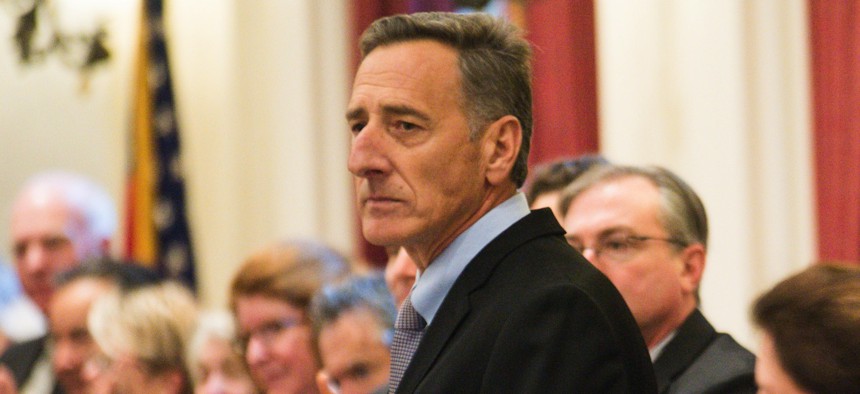Vermont Governor: To Combat Opioid Crisis, the Way Pain Pills Are Prescribed Must Change

Vermont Gov. Peter Shumlin delivers his final State of the State Address on Thursday, Jan. 7, 2016, at the Statehouse in Montpelier, Vt. Andy Duback / AP Photo
“It isn’t the drug dealers from South America that are our biggest challenge, it’s our federally-approved drugs that we’re passing out like candy,” according to Gov. Peter Shumlin.
WASHINGTON — Blasting big pharmaceutical companies, and raising questions about the influence their lobbying dollars have over federal policy, Vermont Gov. Peter Shumlin on Friday argued that stemming the sharp rise in painkiller and heroin addiction that has plagued his and other states will require changes in the way pain medication is prescribed.
“I can explain our challenge not in words, but with three letters: F, D, A,” the governor said, referring to the U.S. Food and Drug Administration.
“It isn’t the drug dealers from South America that are our biggest challenge, it’s our federally-approved drugs that we’re passing out like candy,” he added. “This town is a tough place to talk about it. Why? A few years ago big pharma gave enough money to lobby for their causes so that it works out, if you divide it . . . to $435,000 per congressperson.”
Shumlin delivered his remarks during a talk at The Pew Charitable Trusts’ offices in the nation’s capital, in which he discussed his state’s efforts to push back against the swell of opioid addiction.
Of the 47,055 deadly drug overdoses in the U.S. in 2014, 18,893 were related to prescription painkillers, according to figures published by the Centers for Disease Control and Prevention. That’s compared to 4,400 in 2000.
Between those same two years, deaths from heroin overdoses also climbed steadily to 10,574, from 1,842. Misuse of prescription pain medicine is often seen as a pathway toward heroin.
Food and Drug Administration officials earlier this month announced a plan to reassess the agency’s approach to opioid medications.
Some of the facets of that plan are the expanded use of advisory committees to review new opioid drugs before they are approved, changes to labeling for certain medicines, and incorporating the broader public health effects of opioid abuse into drug approval decisions.
In his State of the State address in January, Shumlin proposed restricting the number of pain pills that can be prescribed for minor procedures to 10, while also considering new limits on the number that can be prescribed in more serious cases as well.
A Democrat now in a third, two-year term that will end in 2017, Shumlin has said he will not seek re-election. During his time in office, he has been active on the issue of combating opioid addiction, and devoted most of his 2014 State of the State address to the topic.
In early February, he slammed two pharmaceutical companies, AstraZeneca and Daiichi Sankyo, for running a television advertisement during the Super Bowl, which urged people experiencing constipation from long-term opioid use to ask their doctors about treatment options to alleviate the condition. Shumlin called the advertisement “poorly timed" and "shameful.”
On Friday, the governor pointed to a number of strides Vermont has taken to help people who are struggling with opioid and heroin addiction. The state, he said, has built out treatment centers, made sure first responders have Naloxone, a drug that can counteract the potentially lethal effects of opioid overdoses, and has also worked to change attitudes, so that those with addictions are seen as having a disease rather than as criminals.
But the root of the problem, Shumlin contends, is the amount of prescription pain medicine that has been getting distributed by doctors, dentists and other healthcare providers in recent years.
“In 2010, we prescribed enough OxyContin in America to keep every single adult high for a month,” the governor said.
Citing the Centers for Disease Control and Prevention, an American Society of Addiction Medicine fact sheet issued this year said that in 2012, 259 million prescriptions were written in the U.S. for opioids. The nation’s population was about 321 million people in 2015.
“Until and unless we are willing as a nation to have the conversation about the way we are prescribing painkillers in America, you will see future governors stand before you, as I am today, talking about a tragedy that is killing 131 Americans a day,” Shumlin warned. He added: “We have got to change the way we are prescribing painkillers.”
PREVIOUSLY on Route Fifty: "New England Struggles to Counter Heroin Addiction"
Bill Lucia is a Reporter for Government Executive’s Route Fifty.
NEXT STORY: Boston seeks chief data officer






